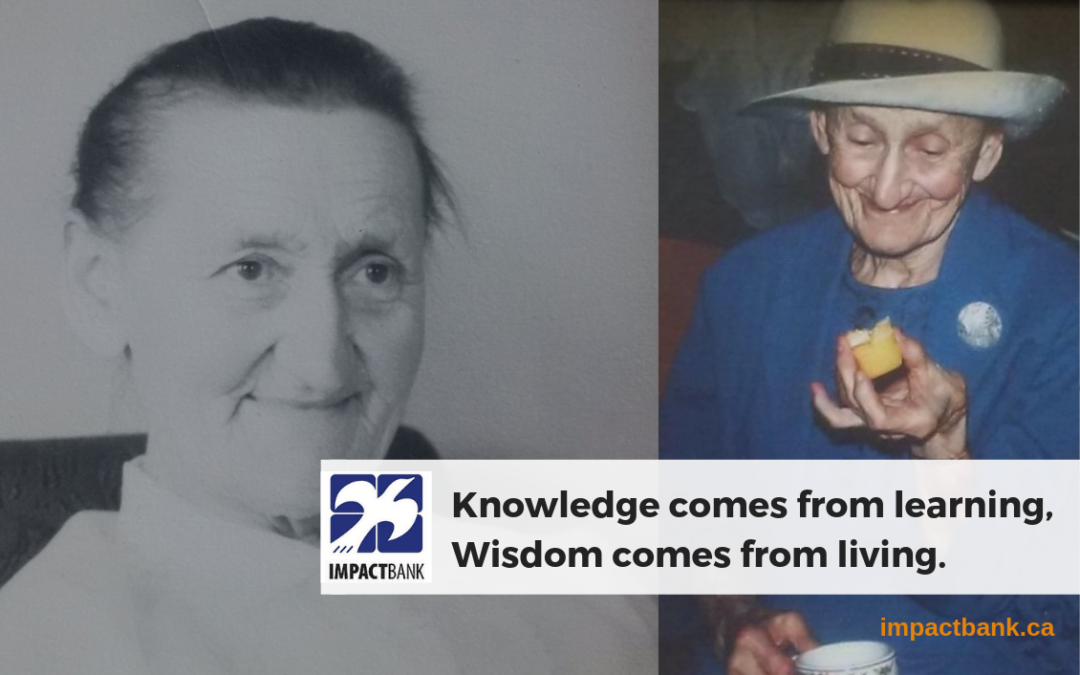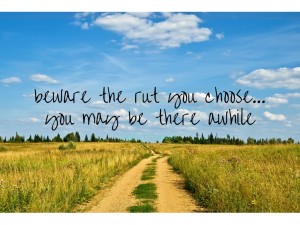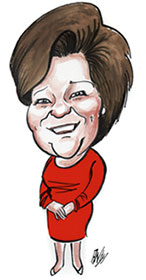Wisdom is a process, not an event. Wisdom is generated through conscious and intentional practice. Furthermore, it’s strengthened by a healthy curiosity.
In this week’s podcast episode I talk about the diligence and consistency demonstrated by my maternal grandmother (Oma), which was how she showed me what real wisdom was. The Wednesday video (posted on LinkedIn and Instagram on February 20th) is based on a little story of how I recognized, even as a child, that Oma was teaching me how to live my life. My weekly newsletter is a reminder that a practice of wisdom is the way out of every rut you find yourself stuck in throughout your life AND the time to be most vigilant is in your 30’s. This blog post brings it together by expanding on diligence and outlining two other components of wisdom, exploring the rut, and outlining two techniques you can incorporate into your life to exercise wisdom.
3 Components of Wisdom
Wisdom is the quality of having and applying experience, knowledge, and good judgment. Information or data seems to rule in today’s world but without wisdom we’ll likely find it doesn’t serve anyone very well. What good is all the data we’re collecting, if it’s not serving humanity broadly!? Perhaps you can already see that. Wisdom is demonstrated through the soundness of an action or decision when applying experience and knowledge.
Diligence
Diligence is a key component of forming and expanding your wisdom. It’s found in the careful and persistent work or effort required to turn the lessons of experience and the insights developed by knowledge into meaningful processes and ultimately, better outcomes. Remember wisdom is not a destination or an event; it’s achieved through diligent practice. Knowledge is often viewed as a destination – knowing something – but anyone who learned a skill, trade or profession has also realized that it’s not a static endeavour. Whether you’re a doctor, lawyer, business leader, teacher, scientist or artist, you learn that to achieve excellence you must choose a life of continuous learning. Learning that’s generated through experience and a willingness to constantly expand your knowledge. Moreover, you’ve realized the importance of applying it all wisely.
Diligence moves you to be productive, disciplined and conscientious when applied wisely. When you are diligent but fail to be wise in the application, you may be rigid on one extreme or throw your hands in the air in despair, on the other. Applied wisdom is the means to make diligence productive.
Perspective
Perspective is one gift related to being wisely diligent. Through perspective you’ll find your wisdom takes on more shades and colours of the rainbow. Perspective expands your options as your ability to see becomes broader. My mom attended art school during the summer after I was born. The knowledge she gained and her willingness to put it into action, impacted my childhood significantly. My sisters and I were thrilled watching our playroom and family-room come to life with the paintings she created on the walls. I’m not the sister who was able to take the lessons in drawing to the next level, but I learned the principles of drawing solid objects on two-dimensional surfaces. This experience offered great lessons in perspective. The concept of perspective essentially, is a particular attitude toward or way of regarding something; a point-of-view. Painting or writing are both great ways to practice shifting your point-of-view.
Perspective is critical to developing wisdom; recognizing your point-of-view and pushing yourself to see another’s. Furthermore, perspective is built on a willingness to be objective, rational, and realistic, when applied wisely. It’s encouraging you to look at things differently. In fact, it brings me back to my motto. “When you change the way you look at things, the things you look at change.” (Max Planck, theoretical physicist and father of quantum physics). Planck’s thinking is grounded in perspective. When applied without a practice of wisdom, perspective can show up in a skeptical, nit-picky, sometimes even paranoid approach.
Focus
Focus is a centre of interest or activity. Additionally, it’s often described as the state or quality of having or producing clear visual clarity. Both definitions work when considering how focus relates to wisdom. Have you ever worked a manual camera? Setting the best “stops” and focusing your lens could change the way you saw a shot. Photography, I learned, is more than pointing the camera. Focus, as an element of wisdom, is too. You’ll cultivate a discerning attitude that’s more purposeful and mindful, when you are able to focus. The application of wisdom offers the means to see with clarity of vision.
When you find you are evaluating every detail with a critical eye instead of looking at the big picture, it’s time to take a step back and consider what really matters. This is the gift focus brings as you develop wisdom. On one hand, without a practice of wisdom, focus is scattered and aimless. On the other extreme, it can appear stoic and intolerant, disconnecting you from others or from the truth.
Stuck In A Rut?
Feel Stuck?
When you feel stuck or caught in a cycle of endless sameness, it can feel like quicksand pulling you in. The phrase I share in the image to the right is cautionary rather than solution-oriented. While it’s ideal to build the skills to avoid the ruts, most people feel caught in them from time to time. In other words, you’re not alone. Feeling stuck in endless ruts is a description of pain I hear regularly from clients. This common life experience starts with how you think about what’s happening to you. Additionally, it’s tied to how you view and experience your own agency. Your ability to make change in your own life.
I speak often about the importance of reflection and processing before taking action. When it comes to feeling stuck though, action is paramount. Not just any action though. This is a time for building a few tiny experiments. Action steps that get you moving. Have you ever been stuck in snow or mud? I have. I remember learning and applying the technique of “rocking” as my dad referred to it. Putting your car in a repetitious rocking motion, forward and back, is the trick to get your wheels out of the mess. If you simply gun the engine, you ultimately dig in deeper and end up more deeply entrenched. I recommend building mini experiments to help you rock your way out. Furthermore, building experiments to better understand your learning, performance or fulfillment goals is a productive focus.
How to get unstuck – 2 Wisdom Techniques
A practice focused on wisdom is the most productive way out of quick-sand. Flailing around is only going to take you deeper. Instead, stop to gain perspective, focus to find a way forward and then diligently and consistently experiment with a thoughtful and agile plan. It’s the way out of any rut.
There are a myriad of techniques that will serve you well when stuck in a rut. The two I’ve chosen to highlight don’t require many resources or a lot of learning to get started. I’d love to meet you in one of my workshops or on-line at one of my Ask Rox RoundTables but in the meantime, consider incorporating one of these two techniques into your day.
1. Breathe Work
You can use your breath to focus and find perspective anywhere. Find yourself in the middle of a conflict that is getting out of control? Use your breathing to calm yourself so you can behave as you choose, not in reaction to the bad behaviour of others. Additionally, use simple breathing techniques in preparation for potentially difficult situations or as part of a solution-finding or insight building exercise. You are literally walking around everyday with the resources for this approach. In other words, with a bit of practice, it’s available to you at any time you need it.
One useful breathing approach is called “square breathing,” where you inhale for four counts, hold for four counts, exhale for four counts, hold for four counts (and repeat). This is an excellent tool for reducing stress, as well as clearing the mind and feeling more grounded. Being mindful also requires a bit of detachment from thoughts and feelings — instead of letting your thoughts and feelings carry you away, you become an objective, non-judgmental observer.
2. Journaling
I often suggest writing exercises to my clients. Most refrain from openly groaning. Of course, some argue they’ve tried journaling and it hasn’t worked for them. Some will openly confess they don’t have the patience to sit and write their feelings or experiences. I have never had a client accept the challenge for at least a month and not express delight in the results. Unfortunately, this isn’t a big sample. Why? The activity is effortful and slow moving and feels vulnerable. I recall one client saying he was afraid his wife would find the journal. He decided to try it out but reported that it didn’t work because he was writing as if someone would read it and judge him. A wise person who is seeking to apply their experience and knowledge effectively will come to realize it’s a vulnerable, courageous act.
One useful way to start a practice of journaling is to buy a cheap notebook, one you’re comfortable throwing away later. Commit to writing three pages per day for 14 days. It’s not necessary to self-censor knowing you can shred it later. In the third week, use your journaling time to read just the third page of each prior entry and circle the descriptive or meaningful words. Take time each day to reflect on your choice of words. It’s on this third page you likely let down your guard and revealed something very useful or insightful. Start the process all over again in the fourth week. Observe whether you are now more vulnerable on pages one or two. Adjust the use of this technique to meet your needs, thereafter, and use journaling to expose and release barriers that hold you stuck.
How We Can Walk together…
In April 2018 I brushed up against a call for meaning; and insight of sorts. It ultimately moved and inspired me to shift the focus of my practice. I’m walking with 30 to 35 year old’s who are in a pivotal spot in your life and career. Whether you’re HERE by age or spirit, I want to walk with you! Are YOU ready to do some self exploring & finding the real meaning of your life? The research suggests you’ll embrace your inner REBEL in your 20’s and that most of you slip quietly into ACCOMMODATOR in your 30’s. Learning this grabbed my attention and my mission was clear. Moreover, I intend to bring out your inner rebel so you can make the difference you really want to make in the world.
In June 2018 I took a course in story telling. I was intent on finding my “Big Why” for shifting my practice. Ultimately, I landed on my story. It spans from my childhood, with a pivotal point in my early 20’s finally culminating in a significant career turning-point at the age of 37. This is the story that illuminated my purpose. In fact, remembering the moment of insight supports my efforts when this transition is difficult. It adds meaning to the work I’m currently doing. Listen below…
Is finding purpose and meaning in your life and in your career important to you?
Are you ready to unpack the tough stuff so you can find your north star?
Is your career all that you want it to be and more? If you answered yes to this last one, I’m so happy for you. Don’t you want that for everyone you know? THEN, pass on my message to everyone in your network in case it resonates for them.
Want to learn to #unpack4impact? Willing to do the work to search for meaning?
Once you have the skills to unpack the emotions and barriers and triggers and mindset challenges with the skills in my system, you’ll begin to see the impact in your career and you’ll find what matters most to you. Join me…
My goal is to make my system accessible and affordable. There are many ways you can engage with me….here are THREE to get started, without spending a dime.
- REGISTER for an ASK ROX RoundTable… TWO 50 minute engagements on ZOOM per month limited to 12 participants in each.
- BOOK a complimentary exploratory conversation 15-20 minutes.
- SUBSCRIBE to my mailing list from my home page, receive an interactive exercise helping you cope with stress, and a weekly reflection.
Of course I’d love to work with you, your team or organization so…
- Book me to speak at your conference or to a group in your organization. My workshops on building resilience, improving relationships, and increasing performance are popular.



